Vietnam is one of the first countries to sign the UN Convention on the Rights of Children and the Convention to Eliminate All Forms of Discrimination against Women. The rights of children and women are one of the top issues of the State and Vietnam has made non-stop efforts to enforce these rights.
In today's talks, our guests - Ms. Nguyen Thi Thanh Hoa, Chairwoman of the Child Protection Association, former President of the Vietnam Women's Union and Mr. Dang Hoa Nam, Director of the Department of Children, the Ministry of Labor, War Invalids and Social Affairs - will answer questions from VietNamNet’s readers related to this issue.
Journalist Ngoc Trang: This is the question of a reader from Danang City for Ms. Nguyen Thi Thanh Hoa. Could you please tell me about the work of ensuring women's rights in recent years?
Ms. Nguyen Thi Thanh Hoa: First of all, the Party and the State are very interested in the women-related work and set goals on gender equality and the advancement of women. In recent years, this work has been particularly concerned and achieved positive results.
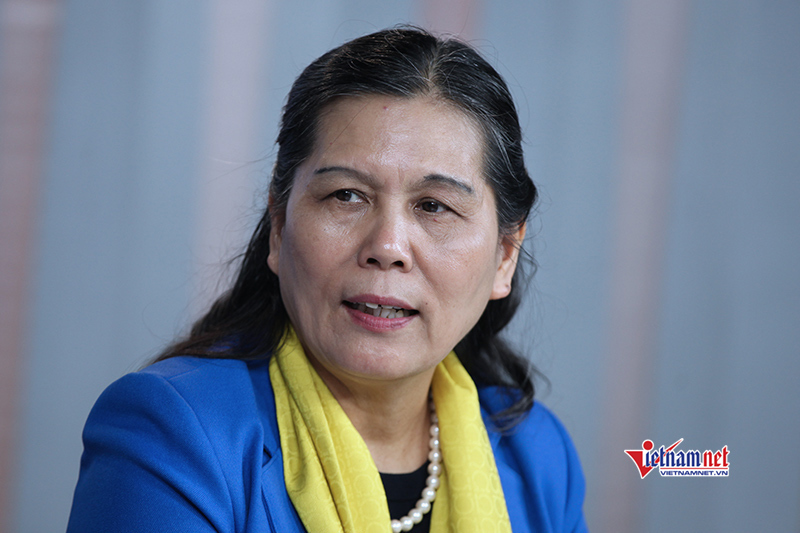 |
|
Ms. Nguyen Thi Thanh Hoa, Chairwoman of the Child Protection Association, former President of the Vietnam Women's Union
|
We have Resolution 11 of the Politburo on the women-related affairs in the period of industrialization and modernization, Directive 21 of the Party Central Committee Secretariat, the Law on Gender Equality, the National Strategy on Gender Equality and especially the 2013 Constitution, Article 26 that clearly stipulates that men and women are equal in all aspects. It can be said that for the first time the concept of gender equality and gender has also been included in the Constitution, the highest legal document of the country.
The actual results in this field are shown through the following numbers. First of all, the percentage of women participating in the labor force in Vietnam accounts for about 73%, much higher than the global average of 49%.
Secondly, in terms of the proportion of women in the National Assembly, after a reduction in the 12th and 13th terms, the figure increased to 26.72% in the 14th term. This is also a very high rate, higher than the average of Asia (19.9%).
The rate of female students is also high, over 50% and the figure is 30% for master degree holders and 17$ for doctoral degree holders.
Journalist Ngoc Trang: A reader from Ha Tinh Province has a question for Mr. Dang Hoa Nam: Could you please tell us the focus, direction, and mission of child protection task in 2020 and the vision to 2025?
Mr. Dang Hoa Nam: The work of protecting children is getting more and more attention from the National Assembly, the Government and the society as a whole. In ensuring the implementation of children's rights, the newly emerging issue is children's rights to be protected and live safely.
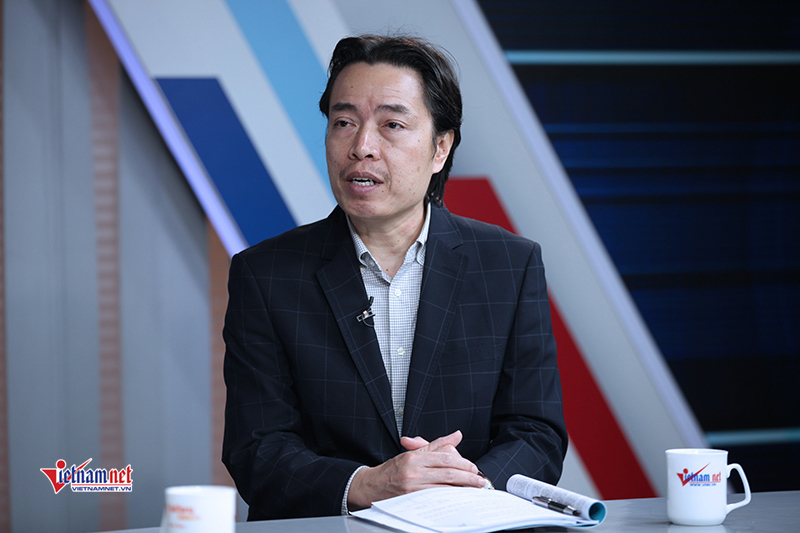 |
|
Mr. Dang Hoa Nam, Director of the Department of Children, the Ministry of Labor, War Invalids and Social Affairs
|
I have to say a little bit about changes in the approach to child protection. Since we ratified the United Nations Convention on the Rights of Children in 1990, the approach of Vietnam and many other countries in the world was primarily protecting children in special circumstances, meaning resolving consequences. Our approach is giving protection to groups of children, for example street children, sexually abused children, exploited children, abandoned children, etc.
However, over the past 15 years, the approach of Vietnam as well as many other countries has changed as we learn from the experience of other countries, especially the developed ones. We have built a comprehensive child protection system.
The first is the uniformity of the law. The Children Law 2016 provides very detailed regulations, ensuring the legal foundation for the child protection system to operate in a synchronized manner.
Secondly, specialized services on child protection recently have made a lot of progress. For example, Call Center 111 is the national call center, one of the special child protection services. Over 40 provinces and cities have centers for social work, focusing on protection of children.
In addition, we have legal aid centers, lawyer's offices, and lawyers' teams who are ready to assist children and their families in terms of justice. We have recently amended and supplemented a number of important laws related to protection of children, such as the Criminal Procedure Code, the Civil Procedure Law, and the Law on Handling Administrative Violations.
However, in the upcoming period, the roadmap has also been indicated that we need to continue to amend and supplement the entire legal system on children’s rights to make it compatible with the provisions on children's rights in the 2013 Constitution and 25 articles on children's rights in the 2016 Children's Law.
Another issue is that we must building a more professional child protection service system in the next 5 to 10 years.
Thirdly, the central task, instructed strictly by the Prime Minister, is to set up a permanent group to protect children, led by the Commune People's Committees.
Journalist Ngoc Trang: Mr. Dang Hoa Nam, on June 1, 2017, the 2016 Children's Law officially came into effect, which is an important legal basis to protect children. After more than 2 years of implementation, how has the law contributed to ensuring children's rights?
Mr. Dang Hoa Nam: The fact that families, people as well as children and women voiced against abusive acts, especially child sexual abuse, showed that the Law on Children and the Criminal Procedure Code have come to life. Because the Law on Children stipulates:
Firstly, the law specifies the responsibilities of all agencies, organizations and individuals to notify and denounce to the authorities about all acts of child abuse. The law also names the agencies and organizations are responsible for receiving and processing the information, such as police agencies at all levels, the labor, war invalids and social affairs agencies at all levels, representatives of the national call center for child protection or People's Committees of wards and communes.
Moreover, the current coordination among state management agencies and judicial agencies is much better.
With the service system is becoming more and more professional and in the near future if the social work profession and especially the Law on social work is built and passed, it will ensure more solid protection of women and children against abusive acts, and at the same time solving the current problems of judiciary agencies.
Journalist Ngoc Trang: Mr. Dang Hoa Nam, how has the Department of Children implemented the Party and State’s policies on children's rights in recent year? What are the department’s goals and plans in 2020 to raise awareness about children's rights?
Mr. Dang Hoa Nam: The Department of Children is a state management agency in the field of children in general under the provisions of the Law on Children 2016 as well as directly assigned to implement some content related to children such as preventing injury, protecting children or performing state management related to children's participation right.
One of the issues that the Department of Children has implemented in recent years and completed quite well is the task of advising the Government and the National Assembly on policies and laws.
The key task in 2020 and the following years of the Department of Children is to well perform its state management function, so that the Law on Children and other policies and laws can really come to life.
Another very important task is that the Department of Children will develop a new children development strategy to submit to the Prime Minister for approval and effectively address issues related to children.
Journalist Ngoc Trang: Readers Hoang Thi Ha from Hai Phong has a question for Ms. Nguyen Thi Thanh Hoa as follows: "This year the Vietnam Women's Union launched the year "Safety for women and children". So how important is the creation of this environment and from what real context does it come from? ”
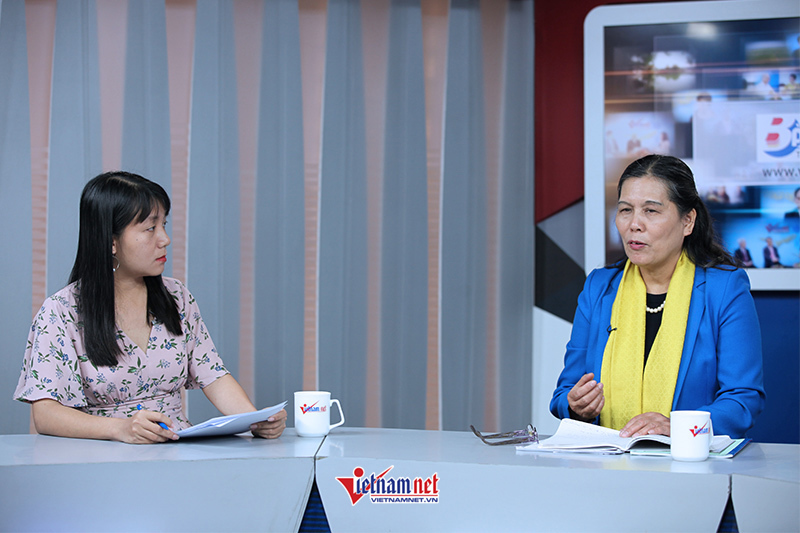 |
|
Ms. Nguyen Thi Thanh Hoa (right)
|
Ms. Nguyen Thi Thanh Hoa: I am also a member of the Central Executive Committee of the Vietnam Women's Union. I greatly appreciate this topic of 2019, which is concise but contains a lot of great meanings. Building a safe environment for women and children is a particularly important task.
Firstly, if the family, social, school or workplace environment is safe, it is the best way to prevent abuse of women and children.
Secondly, the safe environment creates favorable conditions for women and children to develop comprehensively.
Thirdly: Safety everywhere always creates a sense of a peaceful, healthy life. If the mood and spiritual life is good, then the productivity of society will be improved, which is also a good condition for children to study better, parents are assured when taking their children to school or leaving them at home.
In fact, recently the abuse against women and children has increased and become complicated. So raising up a topic like this is a goal to strive for, not just in one year but for many years. 2019 is the first year for us to focus on and create creative ways to ensure safety for women and children who are in vulnerable groups.
Journalist Ngoc Trang: Mr. Nam, in the current context, how important is it to ensure the safety for women and children online? How has our law made progress to keep up with current developments?
Mr. Dang Hoa Nam: Regarding the online environment, we must first mention its positivity. The network environment brings about a lot of benefits and utilities to everyone including children.
However, it must be acknowledged that the online environment is also an environment with a lot of potential risks. For children, that is the risk of accessing malicious, inappropriate, or invasive information.
What should we do in terms of laws and policies to protect children in the cyber-environment and maximize the benefits and utilities of the online environment.
Previously, when the Cyber Security Law was passed by the National Assembly, many people wondered whether this was an increase in state management or a violation of citizen's freedom, etc. But we affirm that the Vietnamese law on cybersecurity is first of all for the people and for the children.
Firstly, children and people in general when joining the cyber environment need to understand that it is similar to the real life. There is also true information, false information, and information that needs to be verified.
Secondly, it is necessary to have a communication culture on the network environment.
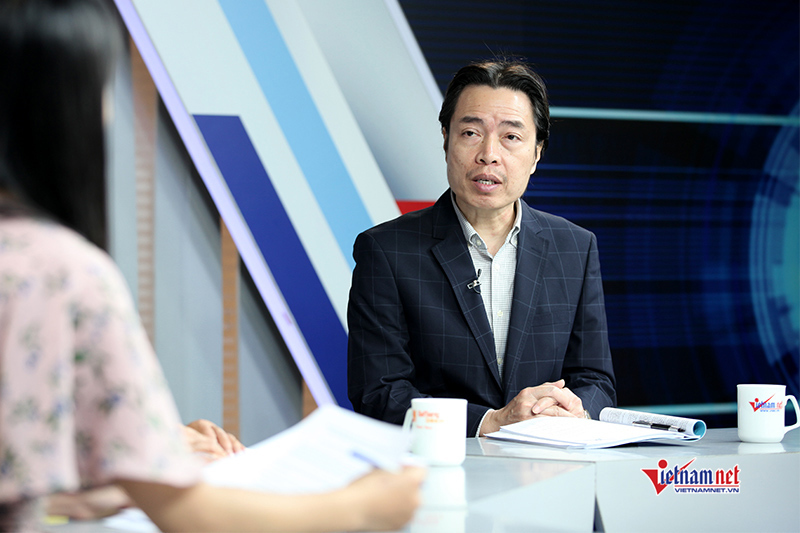 |
|
Mr. Dang Hoa Nam
|
Thirdly, legal knowledge is necessary. You cannot do anything you want online. When there are acts of infringement on the rights, interests, even infringing on the interests, life, health, and dignity of other people and leaving consequences, those subjects will also be handled by law.
In addition, we believe that the state management agencies of cyberspace as well as the child protection agencies or businesses operating on the online environment have legal and social responsibilities. We need to use the online environment itself to protect children.
We have received active support of Microsoft. Together with Micorosoft Vietnam and Childfund Vietnam, we have developed software so that children and all citizens can use this application to quickly send denunciations or evidence such as audio tapes, images, clips of child abuse acts to National Switchboard 111.
Journalist Ngoc Trang: Ms. Thanh Hoa, reader Hoai Linh from Bac Giang sent the following question to you: “In 2019, how many cases the Child Protection Association has resolved and given advice to and what is the most impressive case?”
Ms. Nguyen Thi Thanh Hoa: We have received 32 letters of citizens and sent 27 documents to the authorities to propose solving cases of child rights violations. We have also sent lawyers to attend hearings. Through Facebook, people asked for our legal advice and intervention in some cases of violations of children's rights.
In particular, I remember a case in Chuong My district, Hanoi that raised disagreement in public opinion because people did not agree with the local police’s investigation results. The case was initially determined by the investigating authorities to be obscene while the evidence showed serious signs of abuse. Thanks to our association’s timely intervention, the case was reinvestigated and the perpetrator was sentenced to life in prison.
Speaking up for progress
Journalist Ngoc Trang: Ms. Hoa, in fact many cases of abuse of women and children are not brought to light by the fear of public opinion, what do you think about this situation in Vietnam?
Ms. Nguyen Thi Thanh Hoa: In Vietnam, in many cases of child abuse, the family is very afraid to speak out. Not only the parents but also the abused children are afraid to reveal. One of the causes for the increase of child abuse, especially child sexual abuse, is the silence of victims.
Sometimes people around know that the child is abused but instead of having sympathy with the child, they look at him/her in a different way. Therefore, the victims and their families are reluctant to speak out for being afraid that the truth may affect the future of their children's education and marriage. This has prevented them from reporting their cases to the authorities.
Sometimes children who are sexually abused do not understand that they have been abused. As their parents are busy doing business, their children do not have the opportunity to talk to and it is so dangerous because sometimes the children are abused again.
I think this silence is a common situation in our country. So the slogan "silence means crime" is hanged in some places or I see banners hanged in schools, calling for students to report their cases of abuse to 111. Those are very good propaganda slogans. However, there is a need to go deeper and have a profound impact on families and parents.
Journalist Ngoc Trang: Mr. Dang Hoa Nam, how do you think about the change of people in speaking out about child violence and sexual abuse in recent years?
Mr. Dang Hoa Nam: When it comes to speaking out about abusive acts, especially sexual abuse against women and children, we have to start with two stories.
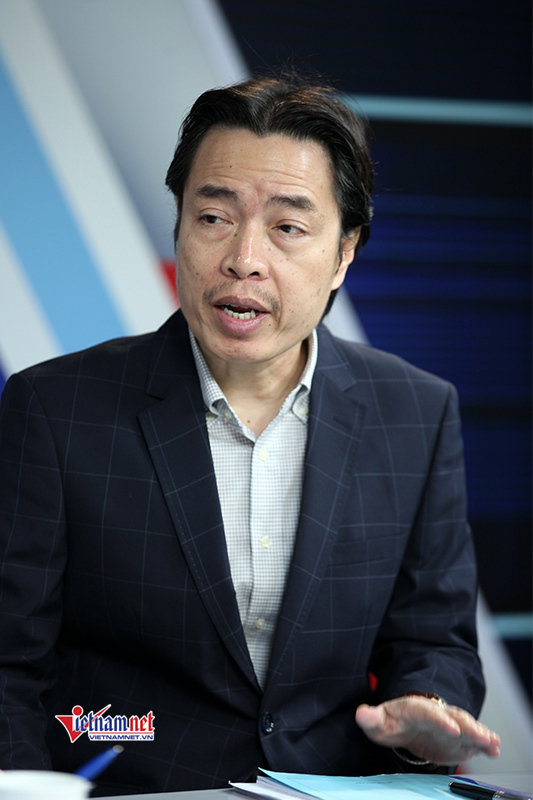 |
|
Mr. Dang Hoa Nam
|
The first story is the Me Too movement, originating from Hollywood, the United States and then spreading to other countries to become a global movement for the women in particular and the abused people in general to denounce abuse behaviors, especially sexual abuse.
The second story: Recently, the legal system of some countries has allowed victims of abuse to denounce abuse acts that took place years ago, even up to 18-25 years. The court still accepts to conduct investigation on such cases.
We believe that these are official ways of attacking abusive acts, especially sexual abuse against children and women because for abusive behaviors, especially sexual abuse against women and children, it is generally difficult to gather evidence and normaly, the abused person is in a weaker position than the abuser.
So to protect the victim, to let the victim dare to denounce abusers, we need to have a change that starts from awareness, from which social awareness will also change. Besides, there should be specific and clear legal provisions, especially those to protect confidential information of the victims.
I think that our women's and children's protection services are much better today. For example, we have the National Switchboard for Protection of Children 111, the peaceful houses, the temporary houses of the Women's Union to help victims find safe places to raise their voices.
Cases of alleged abuse of women and children are likely to increase. This does not mean that the number of abuse cases has increased, but in some respects it reflects social progress, legal progress, cognitive progress, and the progress of social services and public services provided by the state to children and women in particular.
For example, calls to the National Switchboard for Children’s Protection 111 increased from only 1,000 calls of denouncement in 2011-2014, an average of 250 calls per year, to 1,680 calls in the period of 2015-2018, or 400 calls a year on average. In the first half of 2019, there were up to 353 calls
This shows that more people are ready to speak out and this fact does not reflect increased social instability but rather a progressive trend. I think that if we do well in improving the legal work, services, awareness of people, families, children and women, in the next few years the cases of abuse, especially sexual abuse against women and children will diminish.
I would like to say more about the National switchboard for child protection 111. This is a very special public service. Legally, this switchboard is set up by the Government and the Ministry of Social, War Invalids and Social Affairs is assigned to manage and operate it. The Ministry then assigns the Department of Children to operate the switchboard. We will widely advertise National Switchboard 111, especially in remote areas.
Journalist Ngoc Trang: In your opinion, what role does the law play in motivating people to denounce child abuse cases?
Mr. Dang Hoa Nam: In developed countries, the Law on Children stipulates that anyone, including family members, must denounce the acts of child abuse if they witness it otherwise they will be punished. In the long run, Vietnam’s Children Law will have similar changes. I think that in the process of amending and supplementing the law for the next 5 years and 10 years, we must have more specific regulations, especially sanctions for acts of child abuse.
Journalist Ngoc Trang: Ms. Hoa, the disparity in awareness and implementation of women's and children's rights between the city and the countryside is quite large. What is your view on this issue?
Ms. Nguyen Thi Thanh Hoa: In fact, I observed that in many cases of child abuse, abusers usually came to negotiate with the victims' families. If they did not reach agreement, they started to threaten. Many cases were only brought to light when the two sides did not reach an agreement.
In South Korea, they have a very strict rule: those who know of abusive cases without reporting to the authorities will be fined up to 3 million won, about $3,000. I think such strong sanctions force people not to be silent in front of the law.
There is a certain disparity of the awareness on the rights of women and children between rural and urban areas. But as Mr. Nam said, awareness will soon be raised because we have actively propagated the Law on Children, the rights of the children, the Criminal Code, the Criminal Procedure Law..., especially in the rural and remote areas.
Journalist Ngoc Trang: What is your opinion about the difficulties in implementing children's rights in rural and mountainous areas, Mr. Hoa Nam?
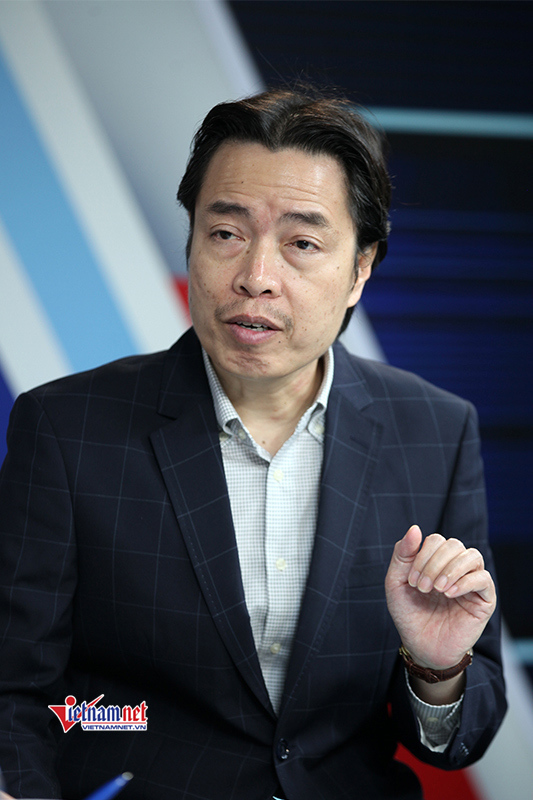 |
|
Mr. Dang Hoa Nam.
|
Mr. Dang Hoa Nam: I think that there is a difficult problem in the prevention of the abuse of women and children in urban and rural areas, especially in mountainous and remote areas – that’s gender prejudice.
The victim of a child sexual abuse case is sometimes intimidated and sometimes they are alleged to have acts that caused the perpetrator’s behavior. For a child, especially a girl, or a woman who is sexually abused, their lives are considered to be ruined.
In some other countries, the perpetrator even after serving his sentence, is still discriminated against by the community, and is forced to leave his residence. In Vietnam, it is very paradoxical, victims of sexual abuse often have to move to other places.
I think that social perceptions, social behaviors for victims and perpetrators of sexual abuse of women and children need to change. Those who deserve to be condemned and carry life-long sentences are the culprits.
New approach from "protection" to "promotion"
Journalist Ngoc Trang: Ms. Thanh Hoa, the revised Labor Code 2019 shows the change of the approach from protecting female workers to promoting gender equality and ensuring rights. Women's retirement age is also increased, which is considered to ensure gender equality. What is your opinion on these issues?
Ms. Nguyen Thi Thanh Hoa: I think it is true that we are changing our approach, from focusing only on the benefits for women, approach to women, now we approace to gender.
The Labor Code changes this very well. If we only focus on protecting women, we sometimes create resistance to them. So, it is better to protecting women from the angle of protecting their rights and the approach from their rights.
The right of gender responsibility is good at this point: not only the mother but the father is allowed to stay home to take care of their newborn baby. It means that the husband is also responsible for looking after the newborn child.
I see this as a very progressive way for us to ensure equal rights for men and women. With the exception of childbirth and breastfeeding, both men and women can both take care of their children.
For the increase of retirement age, this is one way to ensure the right to work of both men and women. Retirement age in Vietnam is associated with many other things. For example, two people of the same age do the same job but at the age of 55, the woman is retired while the man still has the opportunity to get promotion.
Journalist Ngoc Trang: The national strategy of gender equality in the period of 2020-2021 is going to the final years, looking back on this process, how do you evaluate it?
Ms. Nguyen Thi Thanh Hoa: First of all, this is a step forward from the national strategy "For the advancement of women" to an approach from a gender equality perspective. It can be said that this is a step forward in thinking, approach, and awareness.
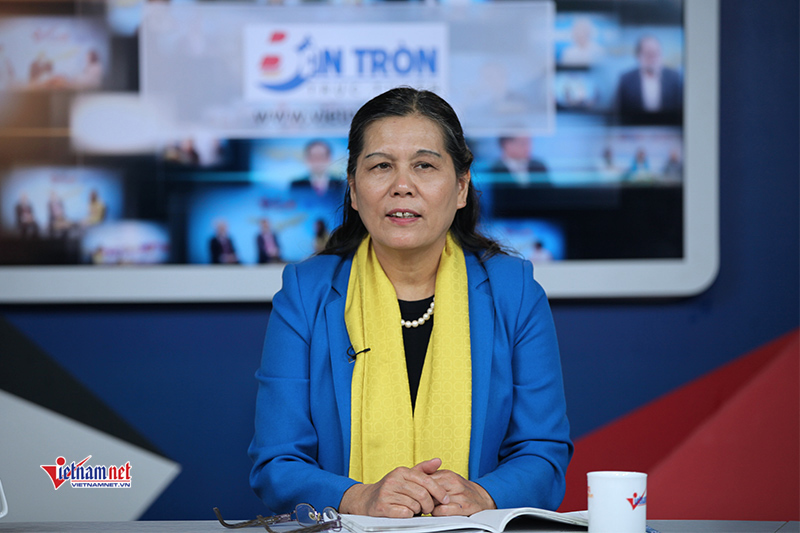 |
|
Ms. Nguyen Thi Thanh Hoa.
|
In the past 10 years, together with the socio-economic development, the whole political system has made great efforts in the implementation of the national strategy on gender equality. We have obtained many achievements, many goals. For the first time we have a Chairwoman of the National Assembly. That is a big step forward for the whole world, not just for Vietnam. We have three female Politburo members. That is, in the policy-making agencies, we have women holding important positions.
Not only in politics, in labor, employment, education, health care, we also make great progress and achieve very good goals.
In the previous period, gender equality was a bright spot recognized in Vietnam. At this stage, we carry out the sustainable development strategy signed with the United Nations. After the promulgation of Resolution 11 of the Politburo and the Gender Equality Law, the integration of legal documents is much better. Gender integration is assessed as the best measure to achieve gender equality goals.
In addition, we also have a number of unfulfilled goals, for example Vietnam is ranked the 174/178th countries in terms of the number of female ministers. Recently, the only female minister, Ms. Nguyen Thi Kim Tien, has retired so we currently do not have any female Government members.
For the target for female MPs, which has increased and is also high compared to the average of Asia, the goals set out in the Party's resolution is 30% but the current ratio is still only 26%. Some other goals such as 95% of ministries, ministerial-level agencies, People's Committees at all levels have key female leaders have not been fulfilled. The ratio is only 40% at present
I think that the efforts and commitments of the Party, the State and the highest levels have been shown in the documents. The Vietnam Women's Union also has many solutions but the achieved results are still beyond expectation. The interest in women on documents is very good, the commitment is very high but the implementation requires the cooperation of authorities at all levels and sectors.
Reducing inequalities in access opportunities
Journalist Ngoc Trang: Reader Huyen Thuong has a question for Mr. Dang Hoa Nam. “Children with disabilities are vulnerable in society. Does the Department of Children have any plans or programs to promote children's rights for this group of children?
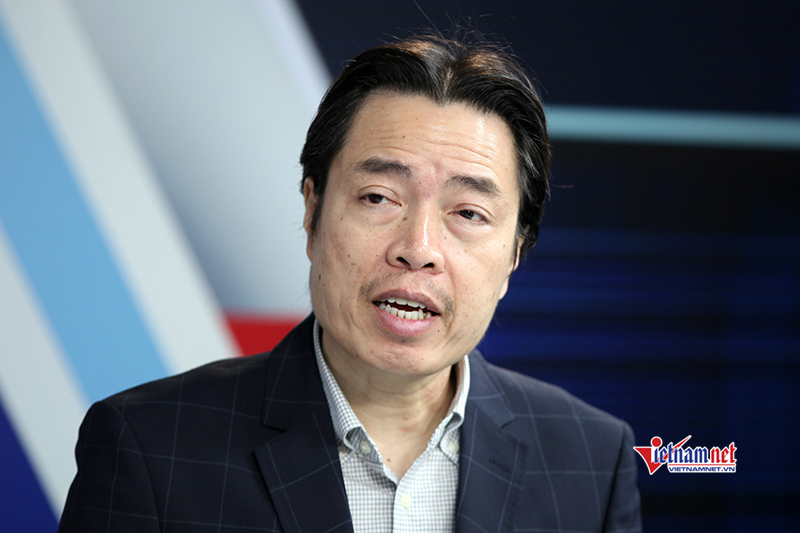 |
| Mr. Dang Hoa Nam |
Mr. Dang Hoa Nam: Children with disabilities are one of the 14 groups of subjects with special circumstances, who need very special support from the family, the State and the society to ensure that they can fully fulfill their rights.
The Law on the People with Disabilities and other policies for people with disabilities have support policies for people with disabilities, especially children.
However, he socio-economic development conditions of our country are limited, the annual budget expenditure, especially the budget expenditure for social protection, is not enough to cover all subjects of social protection or the group of children with special circumstances in general.
Therefore, at present, only children with serious disabilities from poor and near-poor households benefit from the government’s support policies. However, the Law on Children stipulates that depending on the level of socio-economic development, the State will gradually expand the level of support, beneficiaries and age of support for children.
In the coming time, the Department of Children will continue to advise that when the socio-economic development and social welfare are better, children, including children with disabilities, will be prioritized.
Journalist Ngoc Trang: The National Assembly has just passed a resolution on the overall project of socio-economic development of ethnic minorities in the 2021-2030 period. In which gender equality and dealing with urgent issues for women and children are the new contents. What are the characteristics of exercising gender equality and addressing urgent issues for women and children of ethnic minorities?
Mr. Dang Hoa Nam: Regarding children, the most important strategic goal is how to reduce inequality in access to service policies between children in urban and rural areas, children in the plains with children in remote, mountainous areas and children of ethnic minority groups.
In the period of 2021-2025 and up to 2030, we have suggested that strategies for development of children will have to reflect the spirit of the recent National Assembly resolution for ethnic minorities in general and children in particular.
On the other hand, not until the National Assembly issued the resolution, the Government has made policies to support children in mountainous areas, children of ethnic minorities to have the opportunity to develop like other children. The Prime Minister recently issued Decision No. 588 on support, care and education for children in ethnic minority areas and mountainous and extremely difficult communes.
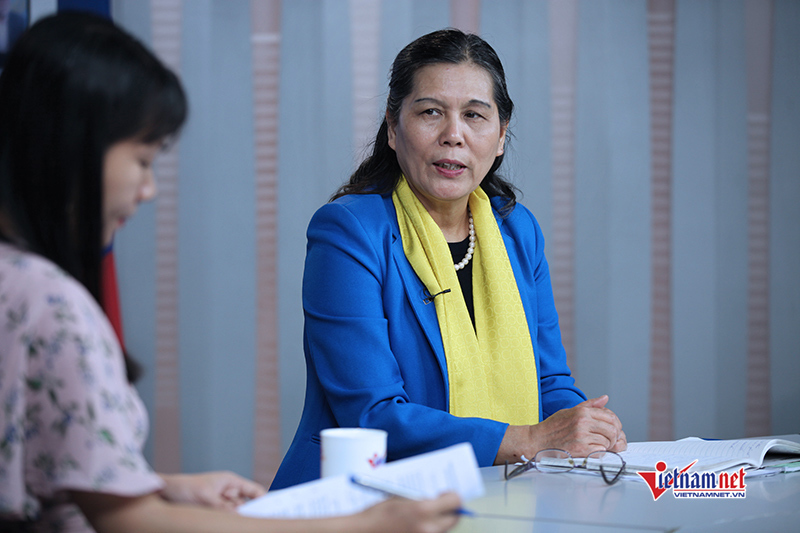 |
| Ms. Nguyen Thi Thanh Hoa |
Ms. Nguyen Thi Thanh Hoa: I find out that the quality of female human resources in ethnic minority areas is still low. The percentage of ethnic minority girls attending high school at the right age is only 33%. The quality of childbirth at home of ethnic minority women is also very low. The mortality rate of children under 1 and 5 years old and the maternal mortality is also quite high.
Therefore, the urgent issue here is how to improve the quality of human resources both physically and intellectually. At the same time, it is needed to integrate gender into all projects of the national target program on socio-economic sustainable development in ethnic minority areas, not just one project on gender equality.
Journalist Ngoc Trang: A reader told us that child marriage in mountainous areas is still common, but in the last 4 years the number of cases has decreased significantly. Please share with our readers some activities that your Association has participated in, regarding this issue, Ms. Hoa.
Ms. Nguyen Thi Thanh Hoa: This is also a problem for children. Children of ethnic minorities must get married early. We have collaborated with relevant bodies to propagate the law and other related content.
At the same time, we have propagandized and advocated for children to go to school, and granted scholarships for those who are at risk of dropping out of school, especially girls because the proportion of child marriage is higher for girls than boys. It is important to help them go to school and realize their future.
Journalist Ngoc Trang: Thank you Mr. Dang Hoa Nam and Ms. Nguyen Thanh Hoa for joining us today.
VietNamNet
 Vietnam has always committed and determined to promote implementation of human rights of women and children. Let's review the progress in the approach, the legal system ... related to this field in recent years.
Vietnam has always committed and determined to promote implementation of human rights of women and children. Let's review the progress in the approach, the legal system ... related to this field in recent years.